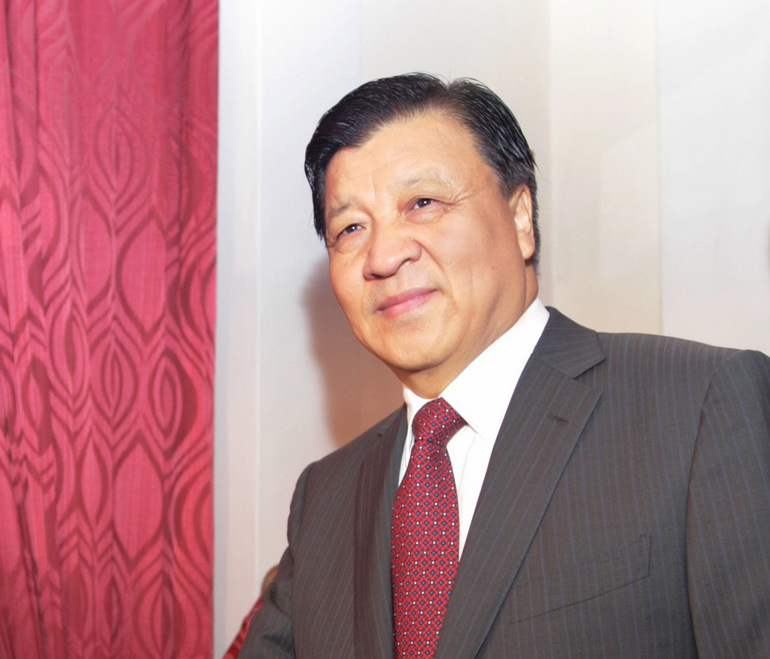
Liu Yunshan, a former propaganda chief who is now a member of the elite seven-member Politburo Standing Committee, called a meeting of creative professionals on October 20. (Creative Commons / Flickr)
Just days after the recent publication of the full transcript of Chinese president Xi Jinping’s major speech on arts and culture from October 2014, the country’s top leadership gave further indication that Xi’s retro vision of patriotic and morality-infused entertainment is meant to have an actual impact on China’s cultural scene.
On October 20, the powerful Central Committee of China’s Communist Party published the “Opinion on the Prosperous Development of Socialist Literature and Arts” (Chinese text here) which among its stated aims has the goal of “earnestly implementing the spirit of General Secretary Xi Jinping’s important speech.” In conjunction with the release of this latest directive, Liu Yunshan, a former propaganda chief who is now on the Standing Committee of the Politburo, convened a major meeting with creative professionals, including actors and filmmakers.
The opinion and meeting are the latest in a series of clear signals that, where culture and entertainment are concerned, the Chinese leadership has no plans to step aside and let the market lead the way, even as president Xi Jinping portrays himself as a cosmopolitan consumer of popular culture in his speeches overseas, dropping savvy references wherever he goes.
The latest directives found in the opinion emphasize the continued promotion of socialist values, patriotism, traditional Chinese culture, and the “Chinese dream,” while warning against market-driven media trends and asserting the continued role of the Communist party in guiding the development of the arts according to these principles.
There is still “conflict within the industry about what the role of Chinese media culture should be,” says Aynne Kokas, an assistant professor in the department of media studies at the University of Virginia whose research focuses on the Hollywood-China relationship. “There are still Chinese state-run studios, still state information agencies and propaganda.” During the current long transitional phase of Chinese media from purely state-run enterprise to a market-driven industry, Kokas says it would be impossible for Xi to advocate for the full globalization or marketization of the film industry.
In some ways, Kokas says, the consistency of the official messages makes them useful tools for understanding the types of content authorities will greenlight for production , offering an awareness of the types of Chinese stories that are desirable and the regulatory limitations now in place. Whether or not Hollywood studios choose to heed the messages’ guidance in order to make their films palatable to the censors in Beijing remains to be seen. There is a rising concern in the creative community in Los Angeles that their industry is under greater economic pressure to self-censor. On October 28, a new U.S. China Economic and Security Review Commission research report outlined numerous instances of American films being edited, revised, or scripted to appease potential Chinese sensitivity on certain topics.
One bright spot in the new directives from Beijing is the call for greater clarity in standards, so that Hollywood would not have to spend as much time guessing at what will pass muster with Chinese censors. The earlier this month on developing socialist arts and implementing Xi’s speech included as one of its 25 bullet points the need to “establish standards of evaluation that can withstand the people’s scrutiny.”
On October 30, the latest draft of China’s long-awaited Film Industry Promotion Law took another step towards enactment when the Standing Committee of the National People’s Congress submitted it for review. While the draft law remains secret, the official People’s Daily reported (in Chinese) that the law foresees the establishment of concrete and publicly available standards for evaluation of films, Such standards could be first step towards establishing a ratings system in China, the current lack of which means that, in theory, any movie screened in China must be suitable for all ages. The reality, however, means that censors have been able to ban films as unsuitable without having to provide any reasons or regulatory basis, while young children easily can end up in theaters watching age-inappropriate violence.
Such standards also would pave the way for the elimination of the current, long-standing requirement that Chinese regulators approve every script before they license it to go into production. The People’s Daily also reported that the new draft law provides that could wait until their films have been completed before submitting them for examination and approval.





